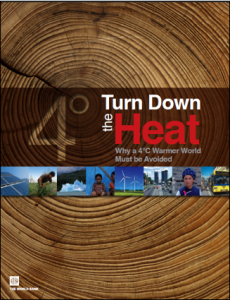By Bill Wilson — A recent report by the World Bank has found that the world will warm by 4 degrees Celsius this century, and that the negative impacts of climate change will disproportionately hurt developing, poorer regions.
The report, “Turn Down the Heat,” warns of rising sea levels, less arable land, droughts, water contamination, more storms at greater strength and more, saying it was “likely that the poor will suffer most and the global community could become more fractured, and unequal than today.”
“We will never end poverty if we don’t tackle climate change,” World Bank President Jim Yong Kim recently told reporters in a conference call highlighting the piece.
The report itself is light on details of how exactly the world’s temperature will be reduced, other than through amorphous “international and regional agreements” to substantially reduce carbon emissions, particularly in developed regions like the U.S. and Europe.
But even if the U.S. and other nations were to voluntarily restrict carbon emissions — a questionable proposition in itself — other nations like China and India would certainly fill in the gap to meet the needs of their own growing populations.
From that perspective, the World Bank’s report makes perfect sense. Perhaps the real agenda of those who cling to a belief in man-made climate change has little to do with alleviating global poverty or combating climate change.
The fact is, without enforcement of agreements restricting carbon emissions, which would require a near totalitarian control over the global economy and sovereignty by some internationalist body, agreements will simply fail to reduce carbon emissions. It is not a realistic policy objective.
So, maybe that is not the goal of such agreements. Examining their likely effects, however, reveals they will simply redirect the flow of the world’s energy trade, redistributing energy resources and wealth toward developing economies and away from the West.
That makes a whole lot more sense than these tortured “scientific” analyses amounting to little more than “the gods are angry”-type explanations for the state of the climate.
Besides, if the radical environmentalists ever did manage to substantially reduce carbon emissions and hence energy output all over the world, would we be able to produce enough food and water for 7 billion people? Or would conditions worsen?
Jim Yong Kim in the report’s foreword promises that “many opportunities exist to dramatically reduce the climate impact of development, without slowing down poverty alleviation and economic growth.” The report then subsequently fails to outline what those opportunities might be, of course.
Probably because they do not actually exist. Instead, it appears likely that a sudden, dramatic decline in energy output everywhere would wreck the global economy. Slower growth would lead to higher unemployment and less resources to go around. All of which would create more poverty, not less.
So let’s cut to the chase. This is about who controls the world’s energy supply. No more, no less. The questionable science of man-made climate change is merely the means to that redistributive end.
Bill Wilson is the President of Americans for Limited Government. You can follow Bill on Twitter at @BillWilsonALG.








